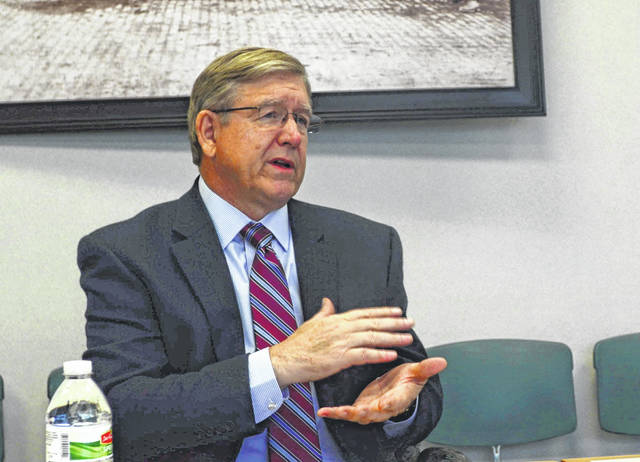
LIMA — As the Ohio General Assembly wraps its latest legislative session, House Bill 6 remains on the books, and Ohio House Speaker Bob Cupp said legislators are still divided on exactly how to approach it.
“Aside from whatever criminal activity may have taken place, the policy in the bill, a lot of it has very good policy,” Cupp said. “You know, members believe that it’s good policy. It’s not just about nuclear plants, it’s about a number of other things as well.”
Passed back in July 2019, HB 6 stripped the state’s renewable portfolio standards in favor of bailing out nuclear power and coal plants on the edge of bankruptcy. Advocates at the time celebrated the savings for taxpayers, which equated to about $3 a month on each Ohioan’s electricity bills.
A year later, federal investigators charged then Ohio House Speaker Larry Householder with doling out $60 million via a bribery scheme in order to pass the bill and shut down a proposed referendum. U.S. Attorney David Villiers, who charged Householder and four lobbyists on racketeering charges, called it “likely the largest bribery money laundering scheme ever perpetrated against the people of the state of Ohio.”
As a result, Cupp was appointed to replace Householder.
But Householder is still around. This past election, he again won his seat in the General Assembly, and HB 6 still stands despite Gov. Mike DeWine calling for its wholesale repeal when news of the federal investigation into Householder was first released.
“While the policy in my opinion is good, the process by which it was created stinks. It’s terrible. It’s not acceptable,” DeWine said.
Cupp said legislators currently fall into three categories when considering the controversial bill. A mostly Democratic contingent is looking to reinstate renewable portfolio standards in line with what 38 other states have already done to foster the burgeoning solar industry. Despite the General Assembly’s apprehension with such a move, almost two dozen solar farms are currently in the application process with the state to create 4,000 MW worth of facilities throughout Ohio. According to the Solar Energy Industries Association, the solar industry employs 7,282 people in Ohio.
On the opposite side of the aisle, another contingent wants no change to HB 6 whatsoever. Under the current bill, Ohio taxpayers would be charged $150 million annually to prop up the Perry Nuclear Power Plant and the Davis-Besse Nuclear Power Plant, but that option has since been put on hold by the Ohio Supreme Court. Just this past Monday, Chief Justice Maureen O’Connor issued a temporary stay on the collection of those funds, which confirmed a preliminary injunction filed by a Franklin County judge earlier this month.
“To not impose an injunction would be to allow certain parties to prevail,” Common Pleas Judge Chris Brown said. “It would give the OK that bribery is allowed in the state of Ohio and that any ill-gotten gain can be received.”
The third option legislators have considered is repealing the nuclear subsidies included in the bill and replacing it with something different. What that actually would be is still on the table.
Cupp said the reality is the Davis-Besse and Perry nuclear plants employ over 1,000 people combined, and there are secondary effects to consider with the decision.
“If we were to start from scratch. Yeah, we probably wouldn’t have any subsidy for anything. But we’re not starting from scratch. We’re starting from where things are,” Cupp said.
As for Householder’s position in the General Assembly, Cupp said his electoral win back to his seat was “unsettling” at first, but since he hasn’t been as active, legislators have taken a wait and see approach to see what may need to be done if they decide to remove him from his seat.
If convicted, Householder would automatically be removed from the General Assembly, but he has pleaded “not guilty” to the federal charges. Cupp said the normal thing for him to do would be to resign.
Either way, both Householder and HB 6 will most likely be on next year’s legislative agenda.
“With the new session, we’re going to take a new look at things and how our committees are going to be structured, who’s going to serve on what committees, and the members of the Republican caucus will be meeting to talk about what our priority legislation will be and what it will look like,” Cupp said. “So this will be kind of an opportunity to reset things.”
When asked about any efforts to ensure such alleged bribery schemes don’t happen in the future, Cupp said using existing laws to prosecute wrongdoings would be the most effective.
“I don’t know that anybody has suggested anything that’s doable at this point, but we are open. Some members have introduced a bill to require more reporting of some of these (campaign) activities. We’re going to be giving that a look, but again because there’s constitutional free speech issues involved in it, there’s just a limited amount of things you can do.”
A campaign finance reform bill was introduced by State Rep. Gayle Manning, R-North Ridgeville, not long after the FBI announced its charges on Householder, but the piece of legislation has failed to leave committee.


